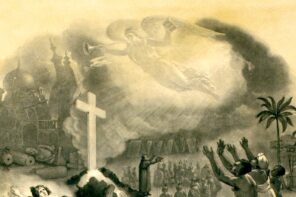A year ago, the University of California at Berkeley announced that it had been awarded a three-year grant from the Henry Luce Foundation, totaling $1 million dollars, to support programming at the Berkeley Center for the Study of Religion (BCSR) devoted to “public theology.” At approximately the same time, the Religious Studies Program at UC–Berkeley declared that it would not accept new majors during the 2015–16 academic year, while a group of faculty overhauled the curriculum.
Large institutions are complex things. There was no reason to assume that these two events were related. But for some scholars of religion, this might very well have seemed like a counterrevolutionary cry of “Religious studies is dead! Long live theology!” The American Academy of Religion’s Facebook page posted the news, which was then broadly shared. Brows were furrowed and heads were scratched, as if Berkeley had announced that it had figured out how to travel back in time to the 1940s. For it seemed that the nation’s most highly ranked public institution had announced an expansion of something that sounded dogmatic and even sectarian—“theology”—and a diminution of something truly public, the academic study of religion.
Now, Jonathan Sheehan, the director of BCSR, has expanded in Religion Dispatches on what he sees as BCSR’s role in a public institution. (What this means for Berkeley’s undergraduate major in religious studies, if anything, remains unclear.) At its best, the piece makes a simple point that, I would think, no one would want to deny. To say, with the humanist, that “nothing human is alien to me,” is to say that it is worthwhile to study what humans do when they are being normative. Theology has been, and remains, one (but certainly not the only) activity through which humans have developed and promulgated the norms that ideally determine their acts. It therefore has a place in the humanities at the university. Full stop, QED, mic drop.
Yet how should teaching or (for a non-teaching unit such as a center) representing theology at the public university occur? Sheehan’s unwieldy definition of theology—“that constellation of conceptual commitments and modes of inquiry that together have enabled communities to investigate and understand the world in religious terms”—makes it difficult to answer such a question. Such a definition imagines doing theology as little more than giving an account of a set of claims that a religious community believes to be true. To imagine theology along these lines is to see the study of theology as akin to a certain kind of anthropology. We can teach the “constellations” of various religious groups to undergraduates. We can invite guests to come to campus and tell us more about their commitments. But Sheehan’s vision suggests that if we criticize these people who are our data, or if we even point out conflicts in their own normative systems—if we meddle at all in their self-understandings—that is at least a breach of scholarly etiquette, and most likely akin to an unethical colonialism.
But while the anthropologist may not be able to fully live the life of the tribe she studies, the student of theology can indeed become a master of the doctrinal tradition she takes up, regardless of her religious beliefs or lack thereof. Such mastery does not only give her the skill to describe a community’s world; it also gives her the skill to intervene in it. The theologian has always possessed that skill. For theology can also be understood as a technique by which a person or a group gains authority over another. It is a technique by which a class of people—for example, women—is allowed to hold certain kinds of power and not others, or is not allowed to hold any meaningful power at all. It is a technique by which that same class of people can point out argumentative faults and begin to hold more power. In other words, theology is not only an activity that brings norms into being; it is an activity that can and does change those norms.
To teach about this activity, or to give it a home on the campus of the public university, is to introduce a university community to a kind of social performance that depends on the fact that ideas can change a world. Sheehan acknowledges this briefly at the end of his essay, when he mentions theology’s “normative and world-making aspects.” But such a phrase is far less sober than his earlier definition of theology as a quasi-scientific investigation of the world that is amenable to various understandings, as if it were a laboratory exercise. That tortured definition is perfect for deans, but it says nothing about theology’s life. The theologian has no compunction about legislating norms for others, regardless of whether they are members of the theologian’s own religious community. The theologian does not know the meaning of tact. The bull in the china shop is her patron saint. Her scholarly discipline, theology, is hotter than Burning Man and louder than her ex-boyfriend’s madras shorts.
Hence the resistance from the lovers of the multicultural public, who fear the incursion of such bad passion into the public university. In releasing it from private ownership, Sheehan thinks that the public university can cool it down and domesticate it—“open it up as a field of inquiry,” as if it were biochemistry.
But the resistance ought to come from those who already style themselves to be theologians. For when we teach theology in the public university, we show that outsiders to a religious community can learn the grammar of religious traditions and end up at least as competent as (if not more competent than!) insiders. Outsiders are just as able to pick out better and worse theological arguments. They are just as able to find sites in traditions’ self-understanding that ought to be hospitable to theological novelty. They can tell an insider that she is wrong to say that one set of norms must be the case, and they can thereby resist authoritarianism. They can also cast serious side-eye at those who hide behind superficial language—for example, a man who says that his political beliefs come from his Christian values but seems to assume that we all know how that works, and gives no theological account of why certain values are Christian and not others, even when describing his own class on public theology.
This expansion of theological skill to outsiders is the threat of theology in a public university. It is true that theology can serve public understanding in the way that Sheehan envisions, but a university that is committed to making theology public must be willing to speak its threats out loud. It must bare its fangs as often as necessary. Hopefully, BCSR has loaded up on breath mints.




